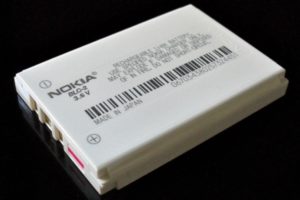
Compared to the common lithium-ion battery (pictured above), lithium-sulfur batteries have important advantages, including cheaper materials and increased energy density.
Credit: Kristoferb Wikimedia
Researchers have developed a new component that could heal the Achilles’ heel of lithium-sulfur batteries.
Compared to the common lithium-ion battery, lithium-sulfur batteries have important advantages: They use cheaper materials and weigh less. A lithium-sulfur cell can have almost double the energy of a lithium-ion cell for the same mass, yielding an edge where energy density is critical, like in portable electronics or in cars.
Improving energy density and cutting costs in energy storage are important steps in reducing greenhouse gas emissions from transportation and energy production.
However, over a few charge and discharge cycles, lithium-sulfur batteries gradually become unstable, and their electrodes break down, a flaw that has kept them from taking the energy storage throne.
In particular, ions of lithium react with sulfur to form compounds that migrate and reduce the capacity of the cell.
“When this happens, they clog the surface and prevent the lithium from getting within the cathode,” said Victor Batista, a […]











Exciting possibilities.